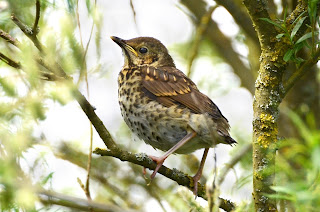Due to a dodgy back I have been using my conservatory as my office for the last week or so (the table and chair height are more sympathetic to my condition - unlike many so called friends). An unexpected benefit to my location has been the ability to watch, close up, the daily struggles of a pair of blackbirds bringing up baby.
I say baby, because there is now, it seems, only one survivor - although having not been able to see into the nest, there may, of course, have only been one hatchling.
During my time watching I have witnessed the two brave parents trying to repel a number of raids from a magpie, whilst each time, a carrion crow sat atop the tree waiting to see what it could pick up from the melee. You shouldn't attribute evil to wild animals - but I confess I found it all a bit hard to accept, even though I know full well, that this is how it is, for millions of birds every day.
It was shortly after this noisy fracas that I first noticed junior bouncing around the lawn, not sure whether his priority was food, or finding shelter. To be honest I didn't give a lot for his chances. So I was delighted a day later, to see a pair of eyes peering at me from the bush just outside my conservatory window
Meanwhile the fearless twosome, in between feeding their surviving offspring, have quite literally chased one of the neighbourhood moggies out of the garden and ferociously set about a pair of bewildered pigeons who had planned on clearing up some seed spilt from a feeder.
Grubs Up
The young bird has fallen off its perch at least once to my knowledge and then reappeared on another branch - I wonder how much longer it can keeping dodging fate. I find it all a bit stressful, wanting to help, but knowing the best thing is to leave it to the parent birds and trust to luck.
Another youngster dodging natures metaphorical bullets was a newly fledged, and very stub tailed, Song Thrush, which I almost stepped on when exiting a hide Sunday morning.
Fortunately, this little chap had got enough flight in him to acquire a branch on the nearest tree. Giving me the opportunity to get a quick photo and wish him luck for the future.






